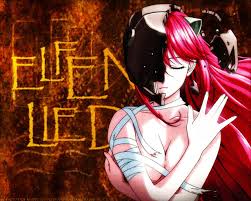Anime Review: Elfen Lied
There is a secret laboratory off the coast of Kamakura, Japan. There a naked woman wearing an eyeless helmet, codenamed “Lucy”, is undergoing experimentation. When the helmet is damaged, allowing Lucy to see, she sets about freeing herself, slaughtering many of the lab’s personnel in the process. Yes, even the adorably clumsy comic relief character. One of the lab’s guards manages to get a shot in that breaks the helmet off and give Lucy a head wound. As we see that the woman has horns, she falls into the surrounding ocean.
Not too long after, a young man named Kouta is walking on a Kamakura beach. He’s recently moved to the city to attend college, and shares a house with his cousin Yuka, a native of the area. Yuka has had a crush on Kouta since they met as children, but he suffered a long illness that has wiped out most of his childhood memories and doesn’t share her interest. Kouta stumbled across a nude girl lying on the beach, who has horns. She appears to be a complete amnesiac, who can only say the word “Nyu.” Nicknaming the girl Nyu, Kouta takes her home for shelter.
Soon, other visitors begin accumulating at Kaede House, but not all of them are friendly. For Lucy/Nyu is a diclonius, a mutant offshoot of the human race with deadly psychic powers. The laboratory wants her back at any cost, because if allowed to run free, Lucy may doom all mankind. Or at least that’s what most of them have been told. Oh, and Kouta’s meeting with Nyu might not have been so coincidental after all.
Elfen Lied is based on a seinen (young men’s) manga by Lynn Okamoto. It’s a peculiar blend of horror and romantic comedy riffs. The characters at Kaede House tend to fall into romantic “types” familiar to anyone who’s watched a lot of anime, but twisted by the horrific backstory.
There is quite a lot of gore and nudity; the powers of the diclonius lend themselves to people being ripped open or sliced apart. Trigger Warnings as well for rape, sexual abuse, torture and child abuse. This is not a series for the weak of stomach. (Indeed, it had to be shown on late-night satellite TV.)
The peaceful seaside town of Kamakura (not far from the Enoshima setting of Tsuritama) contrasts with the often violent events. The real-life location allows for a certain amount of resonance when we see particular sites in flashbacks as opposed to the modern day. It also allows for a certain amount of clash in the backstory; the diclonius are described as wanting to destroy all humans, but all the ones we see have been horribly mistreated by humans in the first place.
It’s also worth noting that all the diclonius with powers we see in the series are female. They are treated as property by many of the male characters, to be killed, experimented on or used as weapons at a whim. This may have a deeper theme, or just be fanservice.
Because the manga was still running when the anime was made, the show ends on an ambiguous note after thirteen episodes. The manga has now finished, but is not yet legally available in English.
The music for the series is…interesting. The opening theme is “Lilium”, a religious song in Latin that serves in-story as a bond between Kouta and Lucy. The closing theme is “Be Your Girl” a peppy sounding pop song (which often clashes with the events just seen) which turns out to be about the pain of unrequited love. The “Elf Song” referred to in the title is not used in the anime, but only sung in the manga by a character that was not in the anime either.
Overall? This series is most assuredly not for everyone, or even most people. You may enjoy it best if you are fond of R-rated horror movies with plenty of gore, but want a bit more character development than you’d normally get.

